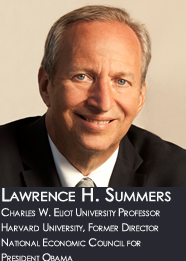CONFERENCE SPEAKERS
Lawrence H. Summers
Charles W. Eliot University Professor at Harvard University, Former Director of the National Economic Council for President Obama, and Secretary of the Treasury for President Clinton
Larry Summers is one of the most distinguished voices in America today on issues ranging from the global economy to education to the role of the United States in the world.
One of the most influential economists of his generation, Larry Summers served in the Obama administration as Assistant to the President for Economic Policy and Director of the National Economic Council, Secretary of the Treasury during the Clinton Administration, and prior to that as Chief Economist of the World Bank.
Dr. Summers emerged as a key economic decision-maker in the Obama Administration. The Economist magazine referred to the "Summers Doctrine" of massive active response to economic downturn combined with respect for markets in the basic allocation of resources as defining the recent approach to economic policy. Dr. Summers was the Chief White House adviser to the President on the development and implementation of economic policy; he led the President's daily economic briefing and was a frequent public spokesman for the Administration's policies. He served as an architect of the Recovery Act and other job creation measures and the Financial Stability Program. As co-chair of the President's Auto Task Force, he led the restructuring of the U.S. automobile industry. He has also played a leading role in managing our international economic relationships including China, developing the President's health care plan, opening the broadband spectrum, and in international climate negotiations.
On Dr. Summers' service, President Obama said, "I will always be grateful that at a time of great peril for our country, a man of Larry's brilliance, experience and judgment was willing to answer the call and lead our economic team. Over the past two years, he has helped guide us from the depths of the worst recession since the 1930s to renewed growth. And while we have much work ahead to repair the damage done by the recession, we are on a better path thanks in no small measure to Larry's wise counsel."
Throughout his term at Harvard from July 2001 to June 2006, Larry Summers was an outspoken and forceful advocate of reform in higher education. His ideas have continued to set the agenda for higher education, including measures building on his elimination of tuition burdens for low and middle income families with incomes under $60,000; creation of major new collaborative cross-disciplinary efforts in the life sciences; establishment of programs to ensure that every student has the opportunity for a meaningful international experience; insistence that faculty take an active role in the undergraduate classroom; and his resistance to anti-Semitism and the exclusion of the military on college campuses.
One of the youngest tenured professors in the modern history of Harvard, he is the only social scientist ever to receive the National Science Foundation's $500,000 Alan T. Waterman Award for Scientific Achievement.
Larry Summers served as a key policymaker in the Treasury Department throughout the administration of President Bill Clinton, ultimately rising to serve as Secretary of the Treasury from 1999 to 2001. His service coincided with the longest period of sustained economic growth in United States history and he was the only Treasury Secretary in the last 60 years to see the national debt decline on his watch. Dr. Summers was closely involved in every major economic policy decision of the Administration ranging from the fiscal policies that created budget surpluses and enabled an historic pay down of government debt, to the enactment of NAFTA, the World Trade Organization, and China's WTO accession, to the response to financial crises in Mexico, Asia and Russia. A Time Magazine cover story dubbed Bob Rubin, Alan Greenspan and Larry Summers the "Committee to Save the World" in recognition of their efforts to contain the Asian financial crisis. At the end of his term Dr. Summers was awarded the Alexander Hamilton Medal, the treasury department's highest honor.
Prior to joining the Treasury, Larry Summers served as Chief Economist of the World Bank where he developed deep interest and expertise with respect to the economies of developing countries. He oversaw major reports on the Asian growth miracle, the global environment and global health issues. His own work included a highly influential economic analysis arguing that providing primary and secondary education to girls was the highest return investment available in many developing countries. He is the 1993 recipient of the John Bates Clark Medal for his work in several fields of economics.


